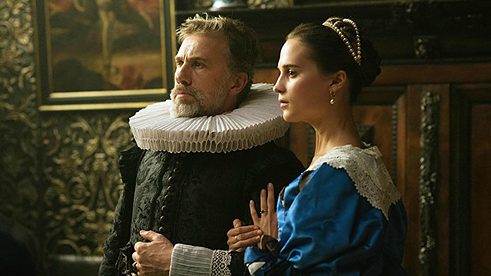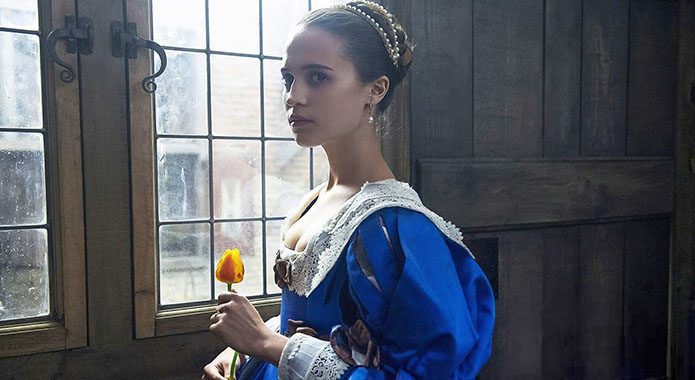Cinema release
Tulip Fever: Blooming flowers, wilting fortunes

The story of 'Tulip Fever'’s journey to the screen is more interesting than the film itself. That’s a reflection both of the prolonged path the movie took to cinemas, and the far-from-intriguing end result. Filmed in 2014, the feature had been mooted since 2004, but wouldn’t see the light of day until 2017. In the 13 years between those initial plans and the movie’s premiere, the proposed production underwent the standard cast swaps, as well as much-less-expected release delays: no fewer than five date changes, to the point where it seemed far from assured that 'Tulip Fever' would ever be seen by an audience.
Now that it has reached cinemas, the Justin Chadwick (Mandela: Long Walk to Freedom)-directed, Deborah Moggach (Pride & Prejudice) and Tom Stoppard (Anna Karenina)-scripted effort doesn’t embody the usual adage that’s often applied in these situations: that good things come to those who wait. Rather, in handsomely shot but woefully plotted and edited fashion, overdone yet dull things come. Adapted from Moggach’s 17th century-set book of the same name, Tulip Fever smacks of a story perhaps working on the page — even with its many contrivances — but thoroughly struggling to maintain impact as a movie.
Given the details at the heart of the story, that’s understandable. Even in ideal circumstances, a tale of an orphan (Alicia Vikander) wedded to an heir-obsessed peppercorn merchant (Christoph Waltz), falling for the handsome artist (Dane DeHaan) tasked with painting their portraits, and getting involved in fake pregnancy plots and tulip trading instantly stretches credulity. Throw in a housemaid (Holliday Grainger) with an absent fishmonger beau (Jack O’Connell), who had been flirting with getting rich from flower bulbs himself, and the narrative becomes a messy web of vanity, lust, greed, mistaken identity, blackmail, betrayal, subterfuge and convenient coincidences. Also featured: a tulip-rearing nun (Judi Dench), a not-quite-by-the-book doctor (Tom Hollander), a wily prostitute (Cara Delevingne), and an unreliable drunk (Zach Galifianakis).
Over-the-top machinations and clichéd dialogue
They may be forced to enact the material’s over-the-top machinations, and spout clichéd dialogue in the process, but some of the cast rises to the task. Grainger’s Maria steals scenes from Vikander’s Sophia in a case of the vivid versus the restrained, while the same can be said for O’Connell’s Willem and DeHaan’s Jan — to the point that switching he film’s focus from one couple to another wouldn’t have been unwelcome. That Waltz proves the standout may come as a surprise, saddled as he is with the cuckolded husband role; however, he makes the beleaguered Cornelis Sandvoort a source of greater depth than anticipated. Evolving from buying a young, pretty wife to birth him a son to learning to appreciate more than his name and social standing, he’s never the cookie-cutter villain he could’ve easily been. Alicia Vikander in 'Tulip Fever'.
| © Tulip Fever
For Chadwick, his period efforts spark reminders of his earlier foray into similar territory with The Other Boleyn Girl; once again lust and lavishness reign, though uneasily. Tulip Fever looks the blossoming part with its elegant, painterly staging, and even its softly lit bedroom scenes, but never finds an appropriate tone for the tale’s sex, envy and tulip-bartering theatrics. The fact that the feature’s set-up soon gives way to an onslaught of ridiculous second-half twists and turns hardly helps, while the subject of tulip mania — a real occurrence during the Dutch Golden Age, where interest in particularly colourful flowers flourished — is little more than melodrama-heightening fodder.
Alicia Vikander in 'Tulip Fever'.
| © Tulip Fever
For Chadwick, his period efforts spark reminders of his earlier foray into similar territory with The Other Boleyn Girl; once again lust and lavishness reign, though uneasily. Tulip Fever looks the blossoming part with its elegant, painterly staging, and even its softly lit bedroom scenes, but never finds an appropriate tone for the tale’s sex, envy and tulip-bartering theatrics. The fact that the feature’s set-up soon gives way to an onslaught of ridiculous second-half twists and turns hardly helps, while the subject of tulip mania — a real occurrence during the Dutch Golden Age, where interest in particularly colourful flowers flourished — is little more than melodrama-heightening fodder.